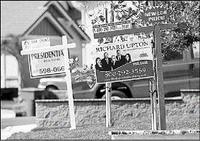
Two houses display 'For Sale' signs side by side on Mulan Street in Corona, California, May 2. In the latter stages of the housing boom, armies of independent mortgage brokers like Musick, and a new breed of subprime lenders like Argent, helped bring a whole new class of borrowers to the housing market, a boom that led to bust for thousands. Reports of fresh damage from the teetering U.S. subprime mortgage sector provoked new financial market wobbles on Tuesday as central banks around the world said their interest-rate intentions had been thrown into doubt.
The European Central Bank, Bank of Japan and Bank of Canada all said market turmoil could affect their monetary decisions, leaving a Friday speech by United States Federal Reserve Chairman Ben Bernanke in the spotlight.
Reports that more financial institutions faced problems, evidence that German confidence had taken a knock and data showing U.S. house prices slid 3.2 per cent in the second quarter from a year earlier, quashed any hopes that the home loan crisis was easing.
The S&P/Case-Shiller U.S. National Home Price Index showed the sharpest decline since 1987.
German business sentiment fell in August as firms took a dimmer view about the next six months following recent market turmoil, the Munich-based Ifo economic research institute's closely watched survey showed.
"The expectations are still positive but not as in previous months. The situation of financial markets has certainly played a role in this," Ifo chief economist Gernot Nerb said.
Germany has borne the brunt of the European fallout from problems stemming from subprime U.S. home loans, as two of its banks have almost collapsed, requiring major bailouts.
Asset-backed conduits
Britain's Times newspaper said institutional money manager State Street faced US$22 billion exposure to asset-backed commercial paper conduits - packages of retail and commercial loans financed by short-term debt raised in the commercial paper market - that have caused problems for rivals in recent weeks.
The Boston-based bank has credit lines to at least six conduits, which account for 17 per cent of its total assets, the paper said, citing regulatory filings.
British bank Barclays denied a report that failed debt vehicles structured by its investment banking arm had left it with an exposure worth hundreds of millions of dollars.
"To say we have hundreds of millions of dollars of exposure to SIV-lites generally is inaccurate," a spokesman for the bank said, responding to a report in the Financial Times.
European share prices headed down as investors rushed to grab safe-haven government bonds. Barclays stock shed more than three per cent.
On Wall Street, the Dow Jones Industrial Average opened slightly lower on the U.S. housing data. State Street's shares were down four per cent.
"The credit story is back with headlines about banks' exposure, meaning that risk aversion is back to the fore," said Ian Stannard, senior FX strategist at BNP Paribas.
INTEREST-RATE JITTERS
Uncertainty about banks' exposure to the U.S. subprime market was matched by doubt about the path of monetary policy.
ECB President Jean-Claude Trichet cast fresh doubt on the chances of a euro zone-rate rise next week.
His last comments on monetary policy made on August 2, when he used the "strong vigilance" phrase signalling tightening was likely, had been made before the current market volatility, he noted on Monday.
Some Bank of Japan policy board members also expressed concern about the risks of U.S. subprime mortgage problems spilling over to global financial markets, minutes of their July 11-12 meeting when they left rates on hold showed on Tuesday.
"We now expect the BOJ could raise rates in November at the earliest because it will take the bank another couple of months to see how the subprime loan problems may affect the real economy," said Masaaki Kanno, chief economist at JP Morgan Securities Japan.
The Bank of Canada said risks to the Canadian economy had risen as a result of credit-market turmoil, adding this would be taken into account at a September 5 interest-rate review.
The central bank said last month when it raised rates that some modest further increase might be needed but Deputy Governor Pierre Duguay said the bank would now need to "assess the extent to which the risks around our July projections have shifted".
China said it had only a limited exposure and its banks had set aside adequate provisions for dealing with the problems.
"Our commercial banks are making very cautious management decisions and have made adequate provisions for any possible risks,"Yi Gang, an assistant central bank governor said.
Banks such as Bank of China and Construction Bank have revealed hefty exposure to the subprime crisis.
All eyes are now on Fed Chairman Bernanke's Friday speech at Jackson Hole.
His theme is 'Housing and Monetary Policy.'
- Reuters

